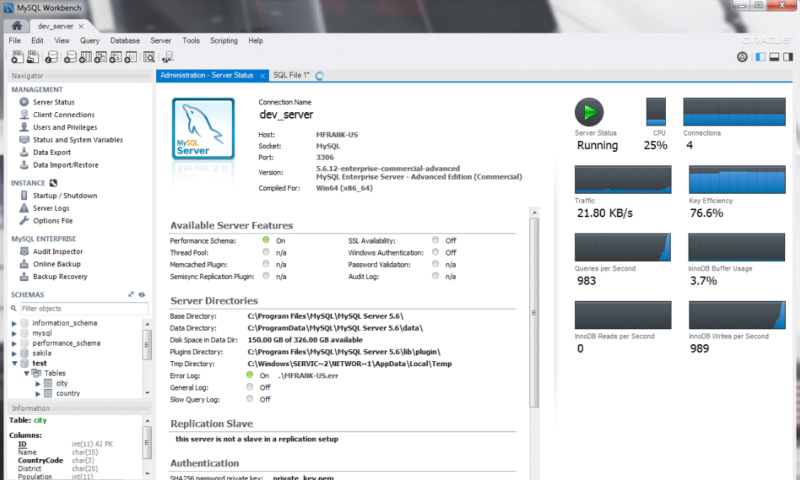MySQL 64 bit Download for PC Windows 11
MySQL Download for Windows PC
MySQL free download for Windows 11 64 bit and 32 bit. Install MySQL latest official version 2025 for PC and laptop from FileHonor.
The world's most popular open source database.

MySQL is the world’s most popular open source database. Whether you are a fast growing web property, technology ISV or large enterprise, MySQL can cost-effectively help you deliver high performance, scalable database applications. Community Edition is the freely downloadable version of the world’s most popular open source database.
MySQL is a component of the LAMP web application software stack (and others), which is an acronym for Linux, Apache, MySQL, Perl/PHP/Python. MySQL is used by many database-driven web applications, including Drupal, Joomla, phpBB, and WordPress. MySQL is also used by many popular websites, including Google (though not for searches), Facebook, Twitter, Flickr, and YouTube.
You can easily administrate the databases through many affordable tools like MySQL Workbench.
MySQL is offered under two different editions: the open source MySQL Community Server and the proprietary Enterprise Server. Enterprise Server is differentiated by a series of proprietary extensions which install as server plugins, but otherwise shares the version numbering system and is built from the same code base.
Key Features
- A broad subset of ANSI SQL 99, as well as extensions
- Cross-platform support
- Stored procedures, using a procedural language that closely adheres to SQL/PSM
- Triggers
- Cursors
- Updatable views
- Online Data Definition Language (DDL) when using the InnoDB Storage Engine.
- Information schema
- Performance Schema that collects and aggregates statistics about server execution and query performance for monitoring purposes.
- A set of SQL Mode options to control runtime behavior, including a strict mode to better adhere to SQL standards.
- X/Open XA distributed transaction processing (DTP) support; two phase commit as part of this, using the default InnoDB storage engine
- Transactions with savepoints when using the default InnoDB Storage Engine. The NDB Cluster Storage Engine also supports transactions.
- ACID compliance when using InnoDB and NDB Cluster Storage Engines
- SSL support
- Query caching
- Sub-SELECTs (i.e. nested SELECTs)
- Built-in replication support (i.e., master-master replication and master-slave replication) with one master per slave, many slaves per master. Multi-master replication is provided in MySQL Cluster, and multi-master support can be added to unclustered configurations using Galera Cluster.
"FREE" Download Atmel Studio for PC
Full Technical Details
- Category
- Code Editors and Development
- This is
- Latest
- License
- Freeware
- Runs On
- Windows 10, Windows 11 (64 Bit, 32 Bit, ARM64)
- Size
- 350 Mb
- Updated & Verified
Download and Install Guide
How to download and install MySQL on Windows 11?
-
This step-by-step guide will assist you in downloading and installing MySQL on windows 11.
- First of all, download the latest version of MySQL from filehonor.com. You can find all available download options for your PC and laptop in this download page.
- Then, choose your suitable installer (64 bit, 32 bit, portable, offline, .. itc) and save it to your device.
- After that, start the installation process by a double click on the downloaded setup installer.
- Now, a screen will appear asking you to confirm the installation. Click, yes.
- Finally, follow the instructions given by the installer until you see a confirmation of a successful installation. Usually, a Finish Button and "installation completed successfully" message.
- (Optional) Verify the Download (for Advanced Users): This step is optional but recommended for advanced users. Some browsers offer the option to verify the downloaded file's integrity. This ensures you haven't downloaded a corrupted file. Check your browser's settings for download verification if interested.
Congratulations! You've successfully downloaded MySQL. Once the download is complete, you can proceed with installing it on your computer.
How to make MySQL the default Code Editors and Development app for Windows 11?
- Open Windows 11 Start Menu.
- Then, open settings.
- Navigate to the Apps section.
- After that, navigate to the Default Apps section.
- Click on the category you want to set MySQL as the default app for - Code Editors and Development - and choose MySQL from the list.
Why To Download MySQL from FileHonor?
- Totally Free: you don't have to pay anything to download from FileHonor.com.
- Clean: No viruses, No Malware, and No any harmful codes.
- MySQL Latest Version: All apps and games are updated to their most recent versions.
- Direct Downloads: FileHonor does its best to provide direct and fast downloads from the official software developers.
- No Third Party Installers: Only direct download to the setup files, no ad-based installers.
- Windows 11 Compatible.
- MySQL Most Setup Variants: online, offline, portable, 64 bit and 32 bit setups (whenever available*).
Uninstall Guide
How to uninstall (remove) MySQL from Windows 11?
-
Follow these instructions for a proper removal:
- Open Windows 11 Start Menu.
- Then, open settings.
- Navigate to the Apps section.
- Search for MySQL in the apps list, click on it, and then, click on the uninstall button.
- Finally, confirm and you are done.
Disclaimer
MySQL is developed and published by Oracle, filehonor.com is not directly affiliated with Oracle.
filehonor is against piracy and does not provide any cracks, keygens, serials or patches for any software listed here.
We are DMCA-compliant and you can request removal of your software from being listed on our website through our contact page.













